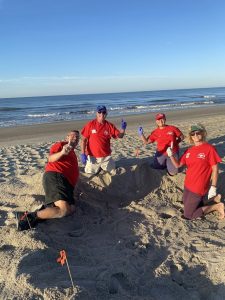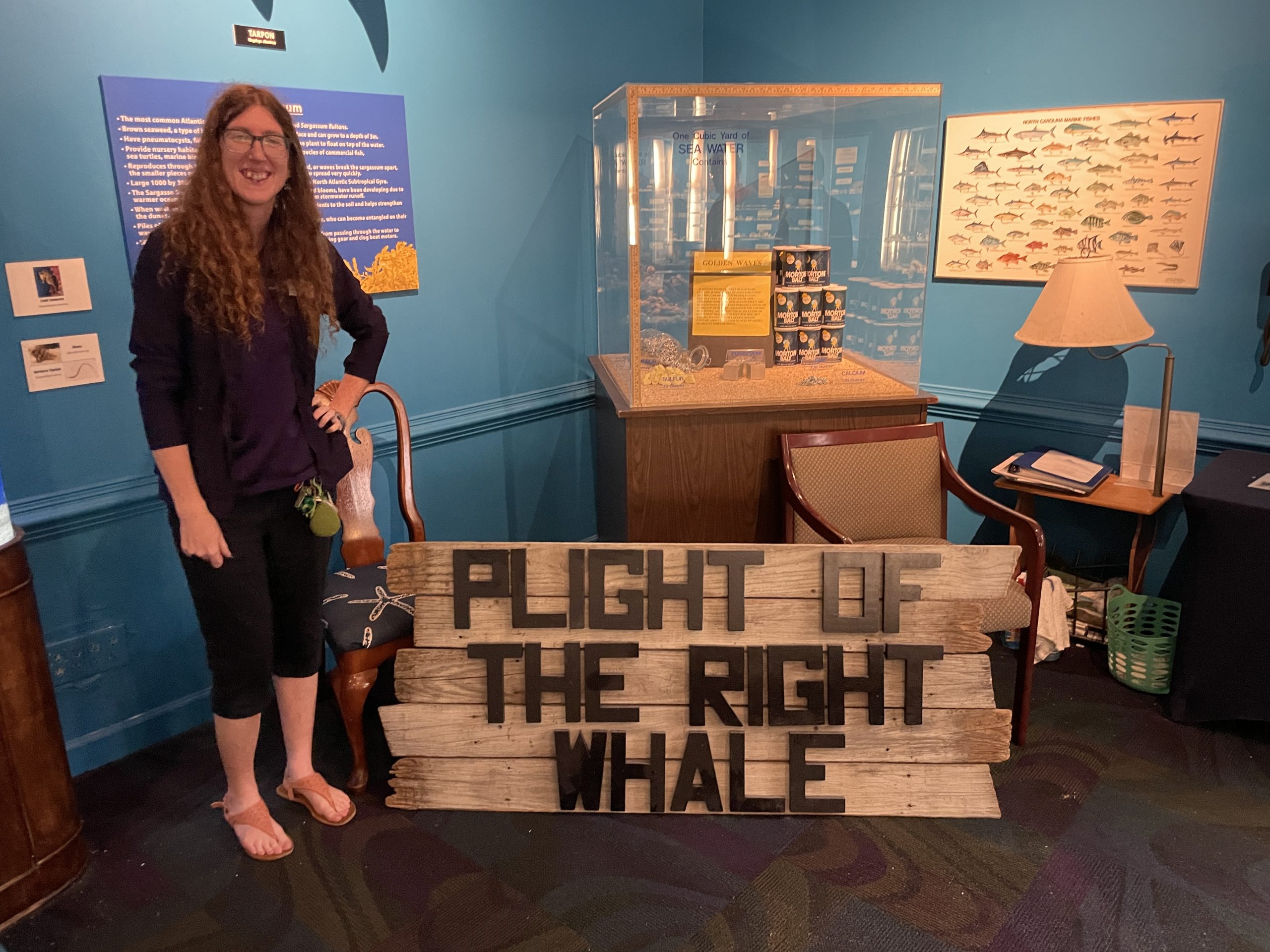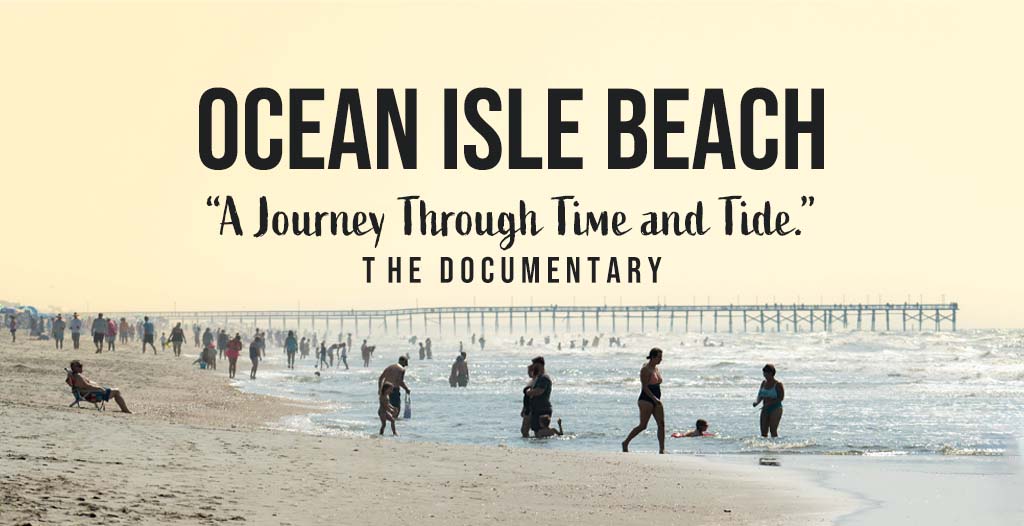 When you head onto one of Brunswick County’s beaches you’ll look out over people in beach chairs and under canopies and children playing in the sand and splashing in the water, but you may not notice that just under the surface there are nests full of eggs laid by the sea turtles who share our oceanfront and need it to keep their species going. On Holden Beach, a dedicated group of volunteers widely known as the Turtle Patrol help keep these nests safe and educate locals and visitors about variety of sea turtles coming to local beaches each summer.
When you head onto one of Brunswick County’s beaches you’ll look out over people in beach chairs and under canopies and children playing in the sand and splashing in the water, but you may not notice that just under the surface there are nests full of eggs laid by the sea turtles who share our oceanfront and need it to keep their species going. On Holden Beach, a dedicated group of volunteers widely known as the Turtle Patrol help keep these nests safe and educate locals and visitors about variety of sea turtles coming to local beaches each summer.
Officially named the Holden Beach Turtle Watch Program, the Turtle Patrol is a volunteer, nonprofit conservation organization operating under the authority of the NC Wildlife Resources Commission. Pat Cusack holds the state permit under which the Turtle Patrol operates and explained what the group does during turtle season on Holden Beach.
“Starting May 1, we ride our ATV on the beach every morning starting at 5 am looking for crawls or nests made overnight,” Cusack said. “When a nest is found, we locate the egg chamber and mark the nest, which then incubates for 50-85 days, the average being 55 days. Usually, beginning in July, we get the nests ready for hatching and nest emergence at 50 days and monitor the nest every evening until the nest hatches and hatchlings emerge.”
This year, the first two turtle nests were discovered on May 22. According to Cusack, as off press time, the number of nests found had risen to 10. He said that’s a bit behind recent years, but not out of the ordinary at all. “Sea turtle nesting typically goes up and down and this may be a low nest year. It is still too early in the season, so nothing to worry about,” he said.
“We also have a Stranding Team that is on call 24/7/365 that handles any stranded — sick, injured, or dead turtles) — and any nesting females during nesting season,” he added.
If you’ve not seen a sea turtle, you may be surprised at how very large they are, and at how long they tend to live. Cusack explained the differences between the four species that have been known to nest on Holden Beach.
“Loggerhead sea turtles are the most common sea turtles encountered and grow to 33-45 inches in carapace length, 250-300 pounds, and live to 80 years. Green sea turtles have increased the number of nests the last few years and grow to 33-45 inches in carapace length, 240-420 pounds, and live to 80 years. Kemp’s Ridley sea turtles, the most endangered sea turtles, nest occasionally in North Carolina and grow to 23-26 inches carapace length, 70-108 pounds, and live to 30+ years. Leatherback sea turtles usually only make 1-5 nests in the state each year, grow to 4.3-5.9 feet in carapace length, 660-2000 pounds, and live 30+ years,” he said.
The Turtle Patrol was founded in 1989 by Judy Bryan with the help of her husband, Rick, and four or five volunteers. She ran the operation out of her garage on Holden Beach’s west end. Today, the Turtle Patrol boasts 105 members, 70 fully active, regular members, 17 senior members who used to be fully active members but have chosen to limit their time and activities, and 18 trainees who will be “in training” for the first year on the patrol, according to communication committee member Donna McGowan.
Because sea turtles are protected under the Endangered Species Act, Turtle Patrol volunteers must follow strict guidelines from NCWRC while working on the beach with the adult turtles and hatchlings. Volunteer training ensures everyone on the Patrol is equipped to one the most help to the turtles.
“The trainees come on board in April, just before the beginning of our sea turtle season, and get a demonstration and orientation of what our responsibilities and tasks include. As soon as turtle nesting begins, they get on-the-job training and close supervision for both the nesting and hatching beach activities until the turtle season ends in October,” McGowan said. “If trainees meet all established experience requirements by the end of the turtle season, they will become regular members the next year.”
This season, the Turtle Patrol will be joined by two UNCW graduate student researchers. The Holden Beach Turtle Patrol has an endowment with UNCW in honor of founder Judy Bryan to support graduate students at UNCW majoring in marine biology, with a preference for sea turtle research. This year’s recipients, Jamie Clark and Caroline VanDuzer, are both studying aspects of local sea turtle populations.
“One of the students is studying how to determine the age of a sea turtle while it is alive, which would be a huge benefit since currently age can only be determined with dead animals. The other student is studying aerobics involved during a sea turtle dive between two different species, Kemps Ridley and Green sea turtles,” Cusack said. “Fellowship recipients have typically not been studying sea turtles we work with and it is good to be able to help them with their projects.”
This year’s trainee roster is full, McGowan said that if people want to join, they can send an email to coordinator@hbturtlewatch.org, or click on the MENU BOX on our website home page and select “Contact Us” and fill out our online form.
Even if you aren’t interested in the training commitment to become a full member of the Turtle Patrol, residents and visitors can help to keep Holden Beach turtle friendly in several ways.
— Be careful with lights on the beachfront. Turn off outdoor house lights during the sea turtle nesting and hatching season. When walking on the beach at night, keep lights (cell phones and flashlights, flash from cameras) at a minimum. Don’t shine lights on turtles and nest areas. At night, adult female and hatchling sea turtles are disturbed by artificial light, including streetlights, flashlights, and camera flashes. Females may return to the ocean and not nest, and hatchlings may become disoriented and head inland to the lights instead of heading to the ocean.
— Fill in any holes (turtles can fall in and be unable to climb out) and pick up any trash on the beach (which you should be doing anyway, really.)
—If you come across a nesting sea turtle, do not approach because they are easily scared. Call the Turtle Patrol Stranding Team at 910-754-0766 so they can come out and protect the turtle. Be quiet and stay behind the turtle with no lights.
If you run across the Turtle Patrol on the beach, don’t hesitate to ask them any questions you might have about our turtle visitors — members love to share their knowledge and excitement about what they do.




